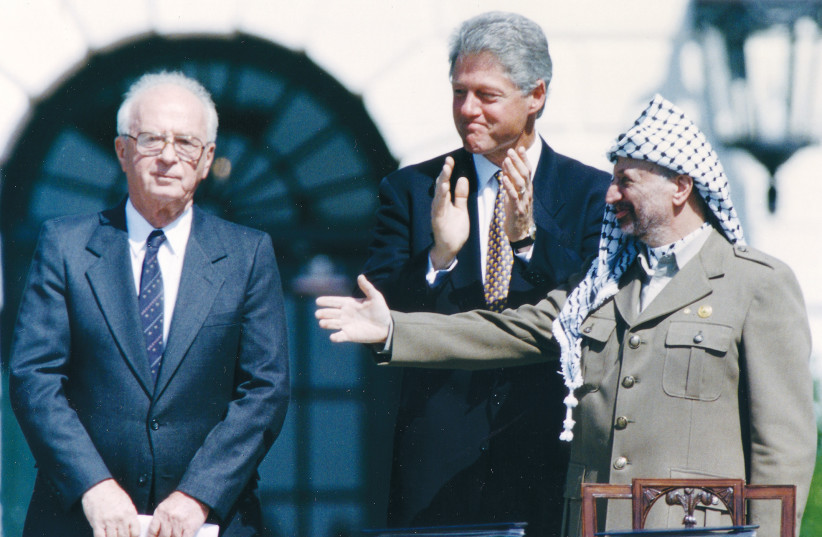In the period leading up to October 7, the issue of the relations between Israel and the Palestinians, and certainly the idea of a Palestinian state, was absent from the political and media agenda. The murderous assault by Hamas awakened this sleeping tiger. The Biden administration was among the first to raise the issue, and may even be planning to unilaterally recognize a Palestinian state as part of its plan for the “day after” the war in Gaza.
Prime Minister Netanyahu and senior ministers in his government, as well as politicians from the political center, have rushed to denounce this idea as constituting a “gift to terrorism.” It is commonly accepted that many in Jewish Israeli society are strongly opposed to a Palestinian state, especially following the events of October 7.
The notion of establishing a Palestinian state within defined borders has been a prominent aspect of Israeli discourse since the 1990s. While it was not explicitly outlined in the Oslo Accords, subsequent negotiations have consistently aimed at achieving this goal.
It is noteworthy that almost every Israeli prime minister since then, including Shimon Peres, Ehud Barak, Benjamin Netanyahu, Ehud Olmert, and Ariel Sharon, has either publicly or privately expressed agreement with the idea of establishing a Palestinian state.
While the willingness to agree to a demilitarized Palestinian state might not be surprising for leaders like Peres and Olmert who advocated for an agreement with the Palestinians and the Arab world, it is perhaps more remarkable that Barak, Sharon, and even Netanyahu, each for their own reasons, also expressed their support for this concept.

Indeed, Barak, who played a significant role in shaping the narrative that there was “no partner” on the Palestinian side, in 2000, during the Camp David talks, proposed a Palestinian state encompassing 91% of the West Bank. A decade later, while serving as defense minister in Netanyahu’s government, Barak emphasized the importance of territorial contiguity for the future Palestinian state, including linking the West Bank to Gaza.
Sharon expressed support for a demilitarized Palestinian state
Surprisingly, and in contrast with his previous stance, Sharon, in 2001, expressed support for a demilitarized Palestinian state.
Furthermore, in 2005, he spearheaded the disengagement from Gaza, which involved dismantling Israeli settlements and withdrawing military presence from the territory.
Despite public denials, the disengagement was conducted in coordination with the Palestinian Authority. Conceivably, it was part of Sharon’s grand vision of withdrawing from a significant portion of the West Bank and facilitating the establishment of a Palestinian state. Daniel Kurtzer, the former US ambassador to Israel, confirmed in an interview that Sharon had shown him maps outlining plans for further withdrawals.
Netanyahu, for his part, has made statements supportive of the two-state solution on multiple occasions throughout his political career.
One notable instance was his 2009 speech at Bar-Ilan University, where he expressed willingness to consider a future peace agreement that would involve the establishment of a demilitarized Palestinian state alongside Israel.
Less widely known are the confidential talks facilitated by US secretary of state John Kerry in 2014, during which Netanyahu agreed to accept the 1967 line, with mutually agreed territorial swoops, as the basis for negotiations in exchange for a Palestinian recognition of Israel as the nation-state of the Jewish people. However, Netanyahu has denied these reports.
It’s worth noting that promising something secretly and then denying having done so is a recurring feature of Netanyahu’s behavior. Thus, for example, in at least two cases he expressed willingness to agree to a complete withdrawal from the Golan Heights. This happened during secret negotiations held with then-Syrian president Hafez al-Assad in 1998, mediated by the Jewish billionaire Ron Lauder; and again during secret negotiations with current Syrian President Bashar al-Assad between 2009-2011, mediated by the US diplomat Frederic C. Hof, then-US special envoy to Syria.
What caused almost every Israeli prime minister at one time or another to express their willingness to agree to the establishment of a demilitarized Palestinian state? One answer could be a response to external pressures, mainly from the United States, when historic opportunities presented themselves to advance a political process and the incumbent prime minister did not want to be seen as obstructionist.
Another possibility is internal politics: The desperate need of Israeli prime ministers for political survival (perhaps bordering on obsession), which requires them to avoid making decisions with the potential to shatter delicate government coalitions. Accordingly, the prime minister is like a weather vane, changing direction in response to the prevailing political winds. Or in the famous words of Henry Kissinger, “Israel has no foreign policy, only domestic politics.”
Only Sharon truly dared to break convention and stand against his own flock, leaving the Likud and founding the Kadima party.
A third possibility, and one which is often not taken seriously, is that these prime ministers, or at least some of them, truly and honestly believed that a demilitarized Palestinian state was the correct solution.
In any case, the idea of establishing a Palestinian state has been a feature of Israeli politics and rhetoric since the 1990s, and the majority of prime ministers since then have expressed willingness to agree to this outcome under certain conditions.
The revival of this discourse following the October 7 attack should not be a cause for anxiety in Jewish society in Israel. It represents an opportunity to fundamentally address a painful problem we have been living with, for nearly a century.
We need courageous and visionary leaders, on both sides of the conflict, who are willing to lead us (rather than being led) to a better future.
The writer teaches in the Department of Islamic and Middle Eastern Studies at the Hebrew University of Jerusalem and is a board member of Mitvim – The Israeli Institute for Regional Foreign Policies.
